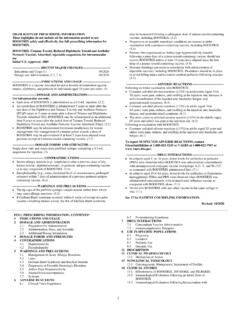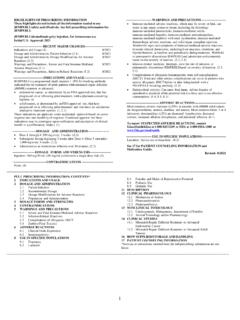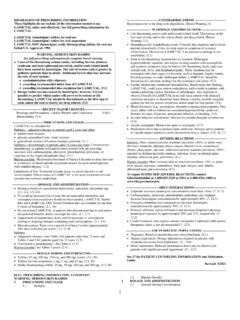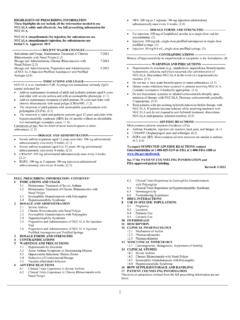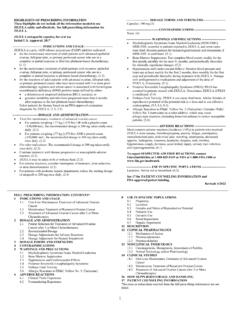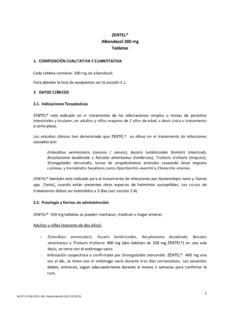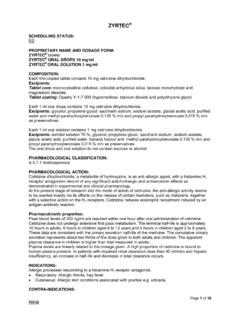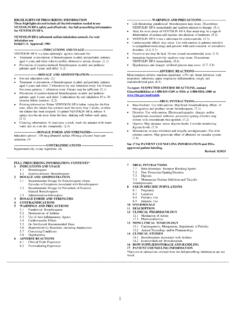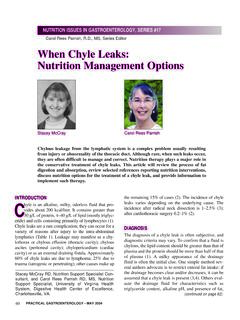Transcription of AUGMENTIN SUSPENSION 228 mg/5 mL and 457 mg/5 mL …
1 AUGMENTIN SUSPENSION 228 mg/5 mL and 457 mg/5 mL . Mixed fruit flavour Amoxicillin trihydrate Potassium clavulanate QUALITATIVE AND QUANTITATIVE COMPOSITION. AUGMENTIN SUSPENSION 228 mg/5 mL: When reconstituted each 5 mL contains 200 mg amoxicillin (as amoxicillin trihydrate) and mg clavulanic acid (as potassium clavulanate). AUGMENTIN SUSPENSION 457 mg/5 mL: When reconstituted each 5 mL contains 400 mg amoxicillin (as amoxicillin trihydrate) and 57 mg clavulanic acid (as potassium clavulanate). PHARMACEUTICAL FORM. A white to off-white dry powder for reconstitution in water to form an off-white mixed- fruit flavoured SUSPENSION . CLINICAL PARTICULARS. Indications AUGMENTIN should be used in accordance with local official antibiotic prescribing guidelines and local susceptibility data. AUGMENTIN SUSPENSION (228 mg/5 mL and 457mg/5 mL), for twice daily oral dosing, is indicated for short term treatment of bacterial infections at the following sites when amoxicillin resistant beta-lactamase producing strains are suspected as the cause.
2 In other situations, amoxicillin alone should be considered. Upper respiratory tract infections (including ENT) recurrent tonsillitis, sinusitis, otitis media. Lower respiratory tract infections acute exacerbations of chronic bronchitis, lobar and bronchopneumonia. Urinary tract infections cystitis, urethritis, pyelonephritis. Skin and soft tissue infections cellulitis, animal bites. Susceptibility to AUGMENTIN will vary with geography and time (see Pharmacological Properties, Pharmacodynamics for further information). Local susceptibility data should be consulted where available, and microbiological sampling and susceptibility testing performed where necessary. Mixed infections caused by amoxicillin-susceptible organisms in conjunction with AUGMENTIN susceptible beta-lactamase producing organisms may be treated with AUGMENTIN SUSPENSION 228 mg/5mL and 457 mg/5 mL. These infections should not require the addition of another antibiotic resistant to beta-lactamases.
3 Dosage and Administration Dosage depends on the age, weight and renal function of the patient and the severity of the infection. Dosages are expressed throughout in terms of amoxicillin/clavulanate content except when doses are stated in terms of an individual component. To minimise potential gastrointestinal intolerance, administer at the start of a meal. The absorption of AUGMENTIN is optimised when taken at the start of a meal. Treatment should not exceed 14 days without review. therapy can be started parenterally and continued with an oral preparation. AUGMENTIN bottle presentations for SUSPENSION may be supplied with a plastic dosing device. For preparation of the suspensions, see Instructions for Use/Handling. The usual recommended daily dosage is: 25 mg/kg/day in mild to moderate infections (upper respiratory tract infections recurrent tonsillitis, lower respiratory infections and skin and soft tissue infections).
4 45 mg/kg/day for the treatment of more serious infections (upper respiratory tract infections otitis media and sinusitis, lower respiratory tract infections bronchopneumonia and urinary tract infections). No clinical data are available on doses above 45 mg/kg/day in children under 2 years. There are no clinical data for AUGMENTIN SUSPENSION 228 mg/5 mL and 457 mg/5 mL. to make dosage recommendations for children under 2 months old. The tables below give dosage guidance for children. Children 2 years and over 25 2 - 6 years ml AUGMENTIN SUSPENSION 228. mg/kg/day (13 - 21 kg) mg/5 ml twice daily or ml AUGMENTIN SUSPENSION 457 mg/5 ml twice daily. 7 - 12 years ml AUGMENTIN SUSPENSION 228. (22 - 40 kg) mg/ 5 ml twice daily or ml AUGMENTIN SUSPENSION 457 mg/5 ml twice daily. 45 2 - 6 years ml AUGMENTIN SUSPENSION 228. mg/kg/day (13 - 21 kg) mg/5 ml twice daily or ml AUGMENTIN SUSPENSION 457 mg/5 ml twice daily.
5 7 - 12 years ml AUGMENTIN SUSPENSION 457 mg/5 ml twice daily. Children aged 2 months to under 2 years Children under 2 years should be dosed according to body weight. AUGMENTIN SUSPENSION 457 mg/5 mL. Body Weight Lower dose at 25 mg/kg/day Higher dose at 45 mg/kg/day (kg) (mL every 12 hours) (mL every 12 hours). 2 3 4 5 6 7 8 9 10 11 12 13 14 15 Renal Impairment No adjustment in dose is required in patients with creatinine clearance greater than 30. mL/min. AUGMENTIN SUSPENSION 228 mg/5 mL and 457 mg/5 mL are not recommended in patients with a creatinine clearance of less than 30 mL/min. Hepatic Impairment Dose with caution; monitor hepatic function at regular intervals. There is, as yet, insufficient evidence on which to base a dosage recommendation. Contraindications AUGMENTIN is contraindicated in patients with a history of hypersensitivity to beta- lactams, penicillins and cephalosporins.
6 AUGMENTIN is contraindicated in patients with a previous history of AUGMENTIN - associated jaundice/hepatic dysfunction. Warnings and Precautions Before initiating therapy with AUGMENTIN , careful enquiry should be made concerning previous hypersensitivity reactions to penicillins, cephalosporins or other allergens. Serious and occasionally fatal hypersensitivity reactions (including anaphylactoid and severe cutaneous adverse reactions) have been reported in patients on penicillin therapy . These reactions are more likely to occur in individuals with a history of penicillin hypersensitivity (see Contraindications). If an allergic reaction occurs, AUGMENTIN . therapy must be discontinued and appropriate alternative therapy instituted. Serious anaphylactic reactions require immediate emergency treatment with adrenaline. Oxygen, intravenous ( ) steroids and airway management (including intubation) may also be required.
7 AUGMENTIN should be avoided if infectious mononucleosis is suspected since the occurrence of a morbilliform rash has been associated with this condition following the use of amoxicillin. Prolonged use may also occasionally result in overgrowth of non-susceptible organisms. Pseudomembranous colitis has been reported with the use of antibiotics and may range in severity from mild to life-threatening. Therefore, it is important to consider its diagnosis in patients who develop diarrhoea during or after antibiotic use. If prolonged or significant diarrhoea occurs or the patient experiences abdominal cramps, treatment should be discontinued immediately and the patient investigated further. Abnormal prolongation of prothrombin time (increased INR) has been reported rarely in patients receiving AUGMENTIN and oral anticoagulants. Appropriate monitoring should be undertaken when anticoagulants are prescribed concurrently.
8 Adjustments in the dose of oral anticoagulants may be necessary to maintain the desired level of anticoagulation. Changes in liver function tests have been observed in some patients receiving AUGMENTIN . The clinical significance of these changes is uncertain but AUGMENTIN . should be used with caution in patients with evidence of hepatic dysfunction. Cholestatic jaundice, which may be severe, but is usually reversible, has been reported rarely. Signs and symptoms may not become apparent for up to six weeks after treatment has ceased. In patients with renal impairment AUGMENTIN SUSPENSION 228 mg/5 mL and 457 mg/5 mL are not recommended. In patients with reduced urine output, crystalluria has been observed very rarely, predominantly with parenteral therapy . During the administration of high doses of amoxicillin, it is advisable to maintain adequate fluid intake and urinary output in order to reduce the possibility of amoxicillin crystalluria (see Overdose).
9 AUGMENTIN 228 mg/5 mL and 457 mg/5mL suspensions contain mg aspartame per 5 mL dose and therefore care should be taken in patients with phenylketonuria. Interactions Concomitant use of probenecid is not recommended. Probenecid decreases the renal tubular secretion of amoxicillin. Concomitant use with AUGMENTIN may result in increased and prolonged blood levels of amoxicillin but not of clavulanate. Concomitant use of allopurinol during treatment with amoxicillin can increase the likelihood of allergic skin reactions. There are no data on the concomitant use of AUGMENTIN and allopurinol. In common with other antibiotics, AUGMENTIN may affect the gut flora, leading to lower oestrogen reabsorption and reduced efficacy of combined oral contraceptives. In the literature there are rare cases of increased international normalised ratio in patients maintained on acenocoumarol or warfarin and prescribed a course of amoxicillin.
10 If co- administration is necessary, the prothrombin time or international normalised ratio should be carefully monitored with the addition or withdrawal of AUGMENTIN . In patients receiving mycophenolate mofetil, reduction in pre-dose concentration of the active metabolite mycophenolic acid of approximately 50% has been reported following commencement of oral amoxicillin plus clavulanic acid. The change in pre-dose level may not accurately represent changes in overall MPA exposure. Pregnancy and Lactation Reproduction studies in animals (mice and rats) with orally and parenterally administered AUGMENTIN have shown no teratogenic effects. In a single study in women with preterm, premature rupture of the foetal membrane (pPROM), it was reported that prophylactic treatment with AUGMENTIN may be associated with an increased risk of necrotising enterocolitis in neonates . As with all medicines, use should be avoided in pregnancy, especially during the first trimester, unless considered essential by the physician.
